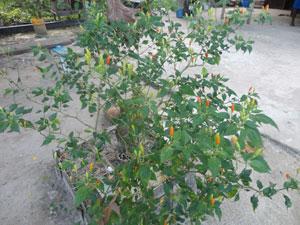IT is perhaps coincidental, but certainly significant that, as Guyana moves to celebrate the 175th anniversary of the Emancipation of African slaves, herbal practitioners and researchers are now paying greater attention and giving credence to the notion long entertained by the former slaves — that Cayenne pepper, or ‘bird pepper’, has tremendous health benefits and can successfully cure a number of illnesses.
 And what’s more, herbal practitioners are reported to have even made claims that Cayenne Pepper is effective in stopping heart attacks.
And what’s more, herbal practitioners are reported to have even made claims that Cayenne Pepper is effective in stopping heart attacks.
As early as the 16th century, the African slaves, forced to find innovative ways of treating illnesses that plagued them and their families, came up with novel ideas of using various fruits and herbs to cure the sick.
Through trial and error, the concoctions of herbal or ‘bush medicine’ invariably worked, and in time became dubbed as ‘life savers’. The local African herbalists were thereafter referred to as ‘bush doctors’.
Cure for ‘thrush’
And so, apart from using the pepper to improve the flavour of their food, the slaves used it for healing purposes. One of the chief functions of bird pepper in their culture was to cure children of “thrush”. Parents feared that the thrush would somehow get into the child’s backbone and ‘eat away at it’. This was a dreadful thought, for they claimed that this could lead to impotence in a male child. Apart from white spots in the mouth, a baby with thrush would pass white seed-like particles in the stool.
For such a condition, the slaves would crush together a few bird peppers and a herb called ‘money leaf’, which they  mixed with coconut oil and managed to insert as far as possible into the baby’s anus. Today, the coconut oil has been replaced by olive oil, and the herbalist would use fresh oil to rub or (‘noint’) the baby’s back, so as to ensure the potion moved high up.
mixed with coconut oil and managed to insert as far as possible into the baby’s anus. Today, the coconut oil has been replaced by olive oil, and the herbalist would use fresh oil to rub or (‘noint’) the baby’s back, so as to ensure the potion moved high up.
As attested to by Ms. Dorothy Peters of Golden Grove, West Coast Berbice, who shares a rich cultural history, the early Africans believed in bird pepper so much so that, even when one of their fowls became sick with pip and such diseases, the owners would throw a bird pepper down its throat and the bird would quickly be revived.
It is also said that the slaves would use bird pepper as a ritual. When they feared that spirits were around, they would burn bird pepper, which they felt would burn, choke and chase the spirits away.
According to contemporary research findings, ‘bird pepper’, known scientifically as Capsicum annum, was reputed to be a pain killer, and was excellent against mucus, among other things.
There is now also evidence that the main ingredient in Cayenne pepper, capsaicin, destroys prostate cancer cells, according to a study coming out of the Cedars-Sinai Medical Center and the University of California, Los Angeles School of Medicine. Studies are also being done to determine the effectiveness of the pepper on lung cancer and pancreatic cancer.
Shared findings
Other illnesses for which bird pepper has been found to be effective, both by the slaves and medical science, include: leukemia; colon and arterial cleansing; preventing the build-up of plaque in the walls of the artery, thus ridding the body of bad LDL cholesterol and triglycerides, while not adversely affecting HDL levels. Bird pepper also cures stomach pain, cramping, gas, and constipation.
Herbal practitioners also say that bird pepper can prove helpful in the fight against diabetes because it regulates blood sugar level, which is essential in treating diabetic conditions.
Nutritional value
Nutritionally, bird pepper is acclaimed to be high in Vitamin A, which stimulates the production and activity of white blood cells; takes part in remodelling bones; and is associated with helping to keep the linings of the skin, lungs and gut healthy, whilst protecting your vision.
Bird pepper has Vitamin C, which helps absorb iron and prevents easy bruising; promotes healing of wounds and production of collagen, the connective tissue that holds bones and muscles (tendons and ligaments) together.
Importantly, Vitamin C is an antioxidant which functions to protect your cells against the damaging effects of free radicals (unstable molecules) which may play a role in heart disease, cancer, and other diseases. Bird pepper also has the Vitamin B complex, besides calcium, required for vascular contraction, muscle function, nerve transmissions and hormonal secretion, among other things.
Potassium is an electrolyte, meaning that it helps to conduct electrical charges in the body. Other electrolytes are: sodium, chloride, calcium, and magnesium.



.jpg)








